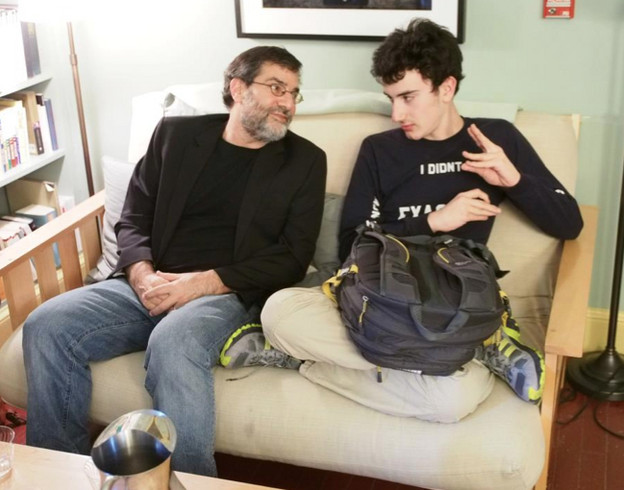Modern poetry: An effect on my open-ness
An open letter by Daniel Bergmann

Note: I met Daniel Bergmann through my 10-week free and open online course – “ModPo,” a study of modern and contemporary American poetry taught through a collaboration of the University of Pennsylvania and Coursera. He was one of 36,000 students. He submitted his first essay — a close reading of “I taste a liquor never brewed” by Emily Dickinson — and it was a fine short essay on the poem. I happened to comment on it; I don't comment on all the essays, I can assure you, but I happened to notice Daniel's and thought it noteworthy. The student on the other end of my comments, posted to the ModPo discussion forum, was ecstatic. So were his parents, a New York-based film-maker and a sculptor. They were aware of this teacher-student exchange because one of them helps Daniel communicate through an iPad configured with special software enabling Daniel to type one letter at a time with one finger. Daniel doesn't speak and indeed he had never written an essay before. It took him a long time. The affirmation pushed him further. He kept up with the course and became one of the most widely recognized participants. He and his parents visited the Kelly Writers House to join us for a live webcast session — to be in the in-house audience for what is otherwise a virtual synchronous gathering hosted through Google Hangout/YouTube and enhanced by twitter and our virtual forums as well as a phone line. Daniel enjoyed that, stayed for my afternoon Penn class on the same poetry, and then spent some time with me in my office at the Writers House (photo above). He returned for the final webcast session and there met a number of his classmates. At the end of the session, when people were invited to create two-word poem-like sayings to summarize the experience of this experimental course, Daniel actual spoke into the microphone — haltingly, but clearly: “Not impossible” was his poem. I challenged him to write about his ModPo experience, and, although it took some time, he has done it. He wrote the words you find below. He is also writing an essay, which I hope to publish in Jacket2, on Ron Silliman's prose-poem “BART,” about which Daniel has a lot to say. He has tasted a liquor never brewed — fine, discerning writing — so it is hardly surprising that he is enebriate of this new air.
*
Dear Professor Filreis,
Please tell Coursera and Penn my story. I am a seventeen-year-old boy emerging from autism. I can't yet sit still in a classroom so ModPo was my first real course ever. During the course I had to keep pace with the class, which is unheard-of in special ed. Now I know I can benefit from having to work hard and enjoy being in sync with the world.
The Coursera format allowed me to say I was autistic in some essays and not others so I could see what life is like with and without my handicap being visible (I had never before written an essay). The students, following your lead when I visited, made me feel welcome and I started to dream about a life in an academic setting where I might someday be of use to others as so many people have been of use to me. The effect is that I feel dramatically less isolated. Your notion that digital learning need not be isolating is very right where I am concerned.
Now the specifics of your course were no less transforming. My father asked me the other day whether ModPo had had an effect on my openness and I was astonished to realize it had.
My whole intellectual life as I've started to emerge from the misty darkness of autism has been an adventure in beauty housed in form and structure. My most favorite curative activity was listening to my father read Shakespeare and ask me to describe the symbols, poetic devices and structures which make the plays work, so I came to ModPo comfortable with close reading. I get my parents to take me to the Uffizi so I can study Botticelli, my music theory teacher shows me how Mozart is structured, so it is not surprising that until I took your class I thought poetry was words stuffed into forms.
Structured art was what I needed to develop my mind, but you showed me a larger world.
In special ed they love to talk about the least restrictive environment a child can function in and you have taught me to function in a greatly expanded artistic one.
Thank you and please let me know how I can help and participate in what, on the whole, is one of the most exciting and worthwhile endeavors that I know about.
Love and thanks to all of you,
Daniel
* *
See this article also.